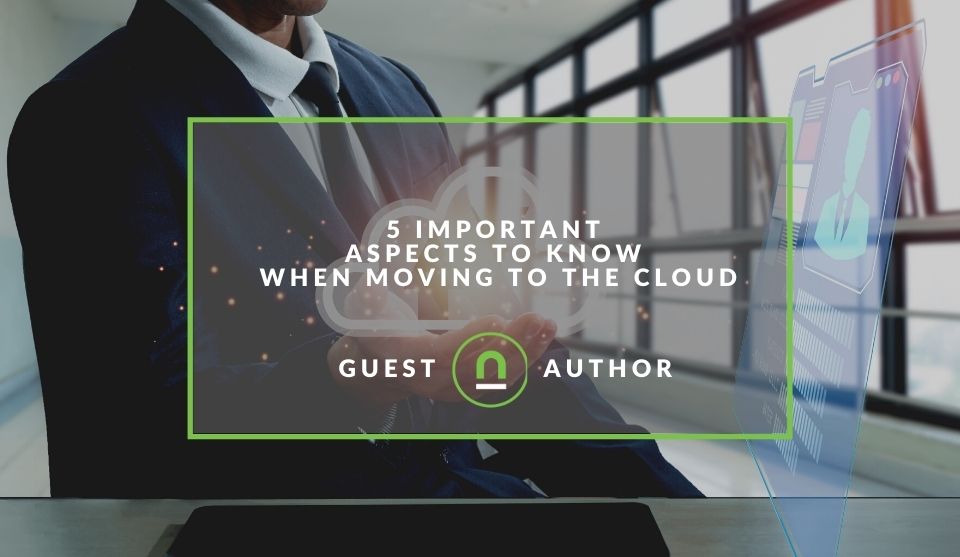Recent posts

Press Releases
Rehab Your Knee: A Free, Evidence-Based Guide to Smarter Recovery
12 February 2026

Money Talks
XRP vs. Stablecoins: Which Is Better for Cross-Border Payments in 2026?
28 January 2026

Press Releases
Sleep Expert Cautioning Against TikTok’s ‘Mouth Taping’ Trend
28 January 2026

Press Releases
Why Vintage Watches Are the Hottest Trend in 2026
27 January 2026
Popular posts
Extravaganza
Trending Music Hashtags To Get Your Posts Noticed
24 August 2018
Geek Chic
How To Fix iPhone/iPad Only Charging In Certain Positions
05 July 2020
Extravaganza
Trending Wedding Hashtags To Get Your Posts Noticed
18 September 2018
Money Talks
How To Find Coupons & Vouchers Online In South Africa
28 March 2019
5 Important Aspects To Know When Moving To The Cloud
17 April 2022 | 0 comments | Posted by Jessica Smith in Geek Chic
Businesses are moving applications and infrastructure to the cloud at an increasing rate. This is a logical business decision for most companies, as the benefits of moving to the cloud generally outweigh those of maintaining on-premise systems.
You can easily upscale or downscale your operations as needed and pay only for what you use. There are also no upfront capital expenditures required; you pay a monthly fee.
Cloud vendors take care of many things, such as security, infrastructure maintenance, and upgrades. While there are many reasons why moving to the cloud makes sense, businesses must research a potential provider's service level agreement (SLA) and ensure that it meets expectations before making this significant business change.
Considering moving your applications to the cloud? Here are five essential aspects to know before leaping.
1. Workloads
Cloud is not a single solution but multiple solutions. It's critical to understand what workloads you want to move and why. For example, you might choose to move an existing application as is with minimal change for the sake of cost reduction or greater flexibility. Or, perhaps you have an application where you can take advantage of the cloud to add new features, such as machine learning.
The more your workload changes, the harder it will be to migrate and maintain it in the cloud. Once you've determined the types of applications you want to migrate, look at how many applications you need to move and how much time and resources each will require. Then consider whether it makes more sense to migrate them all at once or in batches.
Teradata customers can consider partnering with a professional Teradata cloud migration and digital workplace services provider to move their data to the cloud seamlessly.
Besides, you can quickly and easily move your existing applications to the cloud using a secure configuration wizard that performs an in-place upgrade path.
The migration process allows your data to remain on-premises while moving your applications to the cloud -- so you don't have to worry about downtime or confusion from changes.
2. Cloud security
Security is a significant concern for enterprises moving to the cloud. In particular, you need to know what security features the cloud service provider offers, how these features can enhance your existing security and compliance efforts, and if the provider's measures are adequate or if you need to supplement them with your security initiatives.
Cloud security is a crucial part of determining the overall success of your enterprise's migration to the cloud. So it would help if you evaluated whether the service provider's security options will meet your needs.
3. Costs
Be wary of data transfer costs. If you're moving lots of data to the cloud, you'll likely have to pay for it, mainly if your service provider uses a public cloud provider like Amazon Web Services or Microsoft Azure. You might also be charged for incoming or outgoing traffic, often billed at a higher rate than traffic from other servers within the same cloud.
4. Sensitivity of data to distance through latency and network connectivity
It's essential to understand how much latency your application can tolerate. Latency is defined as the time it takes for data to travel over a network. If your application needs low latency for users spread across the world (i.e., >100 ms), then a cloud platform that allows you to host your app in many regions would be beneficial.
The challenge with low latency is that the further away your data is from the user, the longer it takes to travel from point A to point B, which results in slower performance.
For example, a user sitting in San Francisco could experience a latency of 1 ms if you host data on a server in San Francisco, but 80 ms if hosted on a server located in London. Consider optimizing your code and assets by reducing image sizes or caching assets locally on servers closer to the users to combat increased latency.
Network connectivity has implications for latency and availability and is an important consideration when evaluating cloud platforms. It's not enough that you have network connectivity between your on-premises applications and public clouds; you also need access to services like DNS and metadata services.
You need this access even if you're using a private connection because many of these services are provided through public IP addresses on the Internet.
5. Compliance
Compliance is another thing to consider.
- Do you have any regulatory or legal requirements for storing data?
- If so, how will those apply if you move your data to the cloud?
Similarly, you need to know what happens if one of your users wants their data removed from the system.
- Can they do it themselves?
- Do they need to contact your organization?
- Is all of their data deleted at once, or only parts?
- Does it depend on their identity?
Knowing all this information can help ensure that both sides meet compliance requirements and avoid legal fallout later.
Conclusion
Think carefully about the factors described above. Ensure that your company is in a sound financial position before a cloud migration. Also, analyze your needs carefully and make sure that you understand what you're getting into before making this move.
The cloud can be an excellent option for small businesses looking for ways to save money and reduce costs. By evaluating the factors discussed above, you can ensure your business makes an intelligent decision about its IT stability and success.
Tell us your story
Would you like to write for nichemarket just like Jessica has? Find out how to submit a guest post and when you're ready, you can contact us.
Are you looking to promote your business?
South African businesses can create their free business listing on nichemarket. The more information you provide about your business, the easier it will be for your customers to find you online.
Registering with nichemarket is easy; all you will need to do is head over to our sign up form and follow the instructions. If you require a more detailed guide on how to create your profile or your listing, then we highly recommend you check out the following articles.
Recommended reading
If you enjoyed this post and have time to spare why not check out these related posts and dive deeper down the rabbit hole that is starting a business.
You might also like
Why Vintage Watches Are the Hottest Trend in 2026
27 January 2026
Posted by Phoebe B in Press Releases
Jewellery expert reveals why vintage watches are the hottest trend in 2026 and how to care for them while you build your watch collection
Read moreThe Rise of AI Computing Power Assets
16 January 2026
Posted by Rehman Ali in Press Releases
An introduction to Cloud mining and monetising cloud computing as DLMining Reshapes Wall Street's New Anti-Inflation Investment Paradigm
Read more{{comment.sUserName}}
{{comment.iDayLastEdit}} day ago
{{comment.iDayLastEdit}} days ago
 {{blogcategory.sCategoryName}}
{{blogcategory.sCategoryName}}

